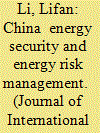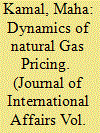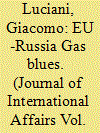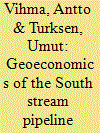|
|
|
Sort Order |
|
|
|
Items / Page
|
|
|
|
|
|
|
| Srl | Item |
| 1 |
ID:
142919


|
|
|
|
|
| Summary/Abstract |
China is facing serious energy security issues. In recent years, China's energy structure has undergone major adjustments, while qualitative changes have taken place in the form of energy security. This raises a new question for China's political, diplomatic, military, technological, and industrial structures: How to safeguard China's energy security? This paper is intended to analyze approaches to energy imports and bottlenecks of energy development, and proposes that international cooperation, development of new energy sources and improvement in energy efficiency will contribute to resolving the energy crisis, and puts forward policy proposals to achieve China's strategy of peaceful development.
|
|
|
|
|
|
|
|
|
|
|
|
|
|
|
|
| 2 |
ID:
142917


|
|
|
| 3 |
ID:
142918


|
|
|
|
|
| Summary/Abstract |
This paper will examine three main pricing mechanisms for gas contracts: oil-indexation, gas-gas competition and netback from final product (e.g. prices linked to Ammonia etc.) in light of the gas contracts in this region that are oil-indexed or linked to oil prices. It will analyze the long term viability and competitiveness of this mechanism for South Asia and discuss natural gas demand in South Asia, conventional and unconventional sources of Natural Gas, as well as the effects of geopolitics in the region on Natural Gas contracts. Remaining cognizant of these developments, this paper proposes the creation of a new natural gas trading hub in South Asia.
|
|
|
|
|
|
|
|
|
|
|
|
|
|
|
|
| 4 |
ID:
142923


|
|
|
|
|
| Summary/Abstract |
An interview with Ambassador Richard Morningstar, founding director of the Global Energy Center at the Atlantic Council, is presented. He discusses the reasons behind the declining energy prices, the current and future economic and political impacts of a decline in energy prices, and issues arising in the nexus of energy and geopolitics, in light of advances in renewable energy and developments in global climate change.
|
|
|
|
|
|
|
|
|
|
|
|
|
|
|
|
| 5 |
ID:
142915


|
|
|
|
|
| Summary/Abstract |
EU-Russia gas relations have come under the spotlight following the annexation of Crimea and the eruption of civil war, with direct Russian involvement, in Eastern Ukraine. Yet tensions in gas relations have been building up for the last two decades, and are primarily related to Europe's strategic decision to unify the gas markets of the member countries and enforce competitive and transparent trading conditions.
|
|
|
|
|
|
|
|
|
|
|
|
|
|
|
|
| 6 |
ID:
142925


|
|
|
|
|
| Summary/Abstract |
Oil anxieties usually stem from fears about running out of oil, but the true oil scourge of the past is overabundance. Oilmen conceal their oil in order to maintain profits and manipulate their monopoly on oil so that they may wield political power. To keep the price of oil high enough to sustain the industry, oil authorities have developed methods of producing scarcity. The results of making oil scarce have been harmful to society economically, politically, and socioculturally. Since current forms of alternative energy are naturally scarce, this article evaluates whether the effects of the oil curse arise from scarcity itself or from the production of scarcity. The destructive experiences with produced oil scarcity inform prospects for a future with alternative energy, including how these energy forms can be developed in ways that avoid the associated effects of the "oil curse."
|
|
|
|
|
|
|
|
|
|
|
|
|
|
|
|
| 7 |
ID:
142916


|
|
|
|
|
| Summary/Abstract |
Energy trade has developed into one of the most contentious and divisive issues between Russia and the EU in the post-Cold War era. It reflects a broader geoeconomic struggle in which economic means are used to advocate geopolitical goals. This article argues that the case of the South Stream Pipeline Project (SSPP)--a grand project abruptly cancelled by Russian President Vladimir Putin in December 2014--epitomizes these power politics. In 2014, Russian leadership advanced both geopolitical and geoeconomic strategies towards the ELI: pursuing the former by conducting a military campaign in Crimea and Eastern Ukraine; and pursuing the latter by pushing the construction of SSPP in spite of the EU's legal and political objections. Due to Russian military aggression in Ukraine, however, the EU was able to harden its line on SSPP. Russian geoeconomic activity has long been successful as a centrifugal, dividing power within the EU. The geopolitical campaign in Ukraine, in stark contrast, has been a centripetal force, resulting in increased EU unity that contributed to the SSPP's demise. This is evidence that claims of geoeconomics as a continuation of war by other means are potentially misleading. The means of geopolitical power projection and geoeconomic power projection thus have notably different effects in today's contemporary, interconnected world.
|
|
|
|
|
|
|
|
|
|
|
|
|
|
|
|
| 8 |
ID:
142920


|
|
|
|
|
| Summary/Abstract |
While global oil prices are down in 2015 and U.S. production is off its recent highs, net increases in U.S. production over the last decade have impacted economies and oil markets around the world, including oil-rich countries in Africa. Algeria, Angola, and Nigeria, all members of the Organization of the Petroleum Exporting Countries (OPEC), each send a share of their crude oil exports to the United States. This article describes the impact of the U.S. energy boom on Africa, particularly sub-Saharan Africa, and discusses some of the challenges and opportunities that have resulted from the fall in U.S. demand for Africa's oil resources. Shifts in trade patterns demand a refocusing of U.S. security measures and an increase in strategic collaboration, as opposed to isolation.
|
|
|
|
|
|
|
|
|
|
|
|
|
|
|
|
| 9 |
ID:
142922


|
|
|
|
|
| Summary/Abstract |
There is a sizable gulf of perception between many in America and many in the Muslim world. One broad notion is that America seeks to dominate locals in the Middle East, and to exploit and even steal the region's oil resources. Tins notion has not been limited to jihadi radicals but has also resonated in lesser doses among many in the Muslim world. The U.S. role in oil-related issues feeds into historical, political, and religious perspectives of an imperialist and power-hungry America.
|
|
|
|
|
|
|
|
|
|
|
|
|
|
|
|
| 10 |
ID:
142924


|
|
|
|
|
| Summary/Abstract |
A number of issues such as climate change, energy efficiency, renewable energy and energy prices have dominated debates on energy. Students from the Energy and Environment Concentration of the School of International and Public Affairs of Columbia University had summer internships in various sectors of the energy industry. They shared their observations on emerging trends in the energy industry with the Journal.
|
|
|
|
|
|
|
|
|
|
|
|
|
|
|
|
| 11 |
ID:
142914


|
|
|
|
|
| Summary/Abstract |
Traditional views of energy security hold that states without reserves of oil and gas should seek to diversify their supply, therefore reducing dependency on any one supplier. Conversely, this view also holds that states with large reserves are believed to use this advantage as political leverage over their consumers. However, empirically we observe a wide variation in energy security strategies by dependent states. While some states do choose costly diversification, this paper introduces a new concept of energy security strategy: active dependence. Under active dependence, states that are reliant on a single supplier of energy do not succeed at pursuing diversification policies, but rather focus on increasing ties with their main supplier state across a host of issues. This active dependence often manifests through a number of cooperative initiatives with their supplier state and favorable energy contract renegotiations. Given the extreme variation in consumer state behavior, what explains variation in the choice of energy security strategy in energy dependent states? Using the case of European natural gas dependent states in the post-Cold War period.
|
|
|
|
|
|
|
|
|
|
|
|
|
|
|
|
| 12 |
ID:
142921


|
|
|
|
|
| Summary/Abstract |
Complex rivalries for influence among regional powers, most notably between Saudi Arabia and Iran but also including Turkey, Qatar and the United Arab Emirates, are transforming the Middle East. As local borders and ruling institutions have become contested in the aftermath of the Iraq War and the Arab Spring, so has control of the region's major oil and gas facilities. Warring militias, the Islamic State of Iraq and Syria (ISIS), Al Qaeda and traditional governments are increasingly focusing on maintaining or gaining control of oil production and refining installations. Additionally, regional conflicts, now complicated by the active military involvement of Russia, have spilled over to affect global oil markets as Saudi Arabia and its Gulf allies, seeking to influence regional military and geopolitical outcomes, have initiated a market share war that has brought about a collapse in oil prices.
|
|
|
|
|
|
|
|
|
|
|
|
|
|
|
|
|
|
|
|
|